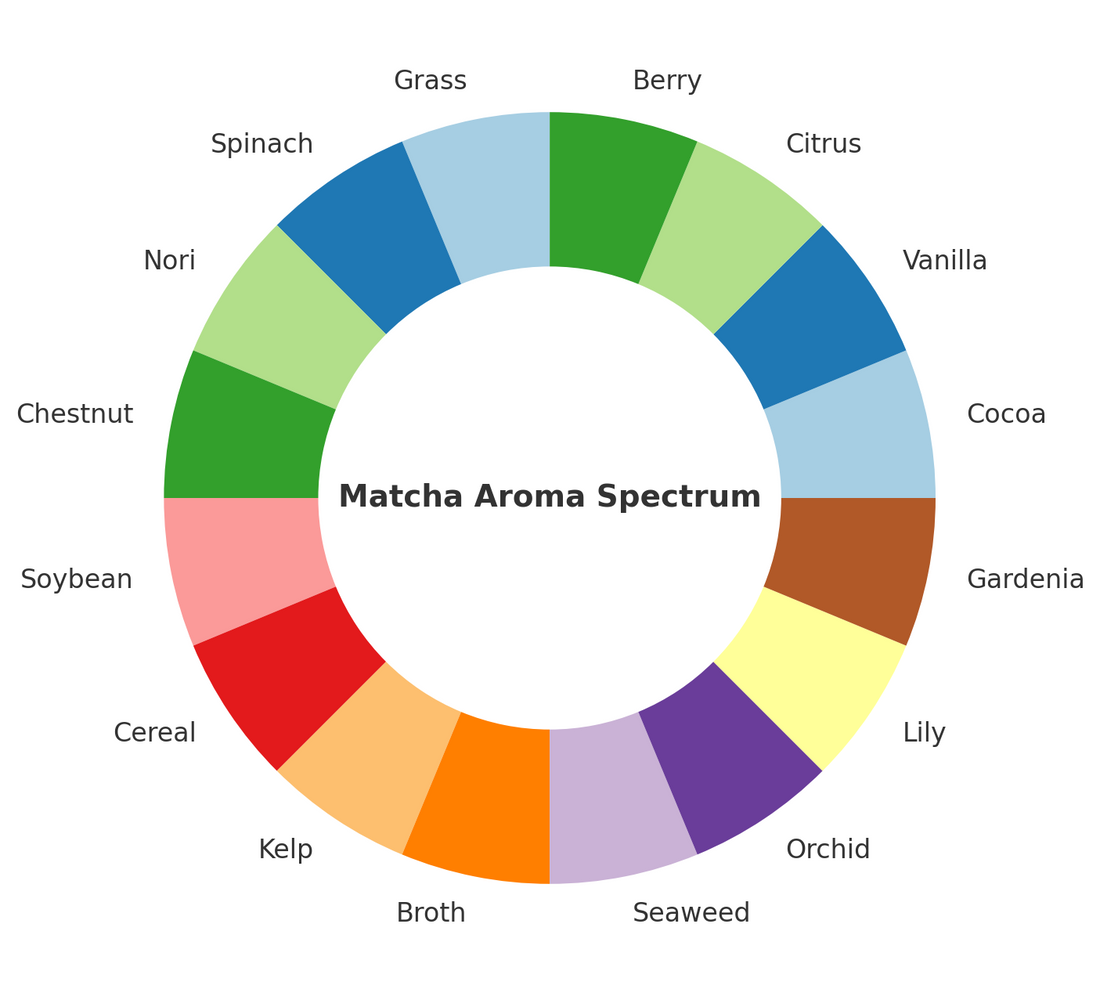
What Does Matcha Taste Like? Layers of Flavor and Aroma
Share
Intro: the short answer
Matcha tastes grassy, smooth, and rich in umami. Good ceremonial matcha is creamy and balanced, with sweet or nutty undertones and almost no bitterness. Some varieties also carry marine depth, like kelp broth, or rare floral hints. Matcha lattes taste milder, creamy, and lightly sweet, while plain tea shows its full vegetal and savory edge. Unlike coffee, matcha feels calm, with steady energy and a layered taste.

A winter morning memory
The kettle clicked. I opened a small tin of matcha. Outside, mist rested over the garden. The air was sharp with cold, but the powder in my bowl gave a soft wave of green scent. It was not coffee, not black tea, but something layered, shifting. I whisked, sipped, and wondered—what exactly does matcha taste like?

First answer: what matcha tastes like
Matcha tastes fresh, vegetal, and rich in umami. The first impression is green, like grass or spinach. A good matcha feels creamy and smooth, with no rough edge. The finish can be sweet, nutty, or even floral. Unlike coffee, the taste does not rush forward; it unfolds slowly with each sip.
The role of aroma in taste
Taste is never only on the tongue. Aroma shapes much of what we perceive. In matcha, aroma falls into four main groups:
Fresh green – notes of grass, spinach, or fresh nori. Comes from chlorophyll and shading.
Roasted nutty – chestnut, soybean, cereal warmth. Linked to roasting and maturation.
Marine umami – kelp or broth, from high amino acids under shade.
Floral sweet – rare orchid or lily tones, from cultivars like Asahi.
Each bowl may carry two or three of these layers, shifting as the tea is whisked.
What does matcha tea taste like?
When prepared as usucha (thin tea), matcha tea tastes fresh and smooth, with a balance of sweet and savory. The foam adds a soft texture. If the tea is high grade, bitterness is almost absent. Lower grade powders may taste harsh, with more tannin.
What does a matcha latte taste like?
In a latte, milk softens the vegetal edge. The result is creamy, nutty, and gently sweet. A matcha latte often highlights roasted and vanilla-like notes, while the grassy side is muted. Compared to plain tea, a latte is easier for beginners, though it hides the finer floral or marine tones.
Matcha taste compared to coffee
Coffee is sharp, bitter, and acidic. Matcha is smooth, umami-rich, and low in bitterness. Coffee pushes energy fast, while matcha releases it steady. For many, the taste of matcha feels calmer—like morning mist compared to a rush of heat.
Factors that shape taste
Cultivar: Yabukita, Okumidori, Asahi, Samidori—all show different notes.
Shading: Longer shading builds umami and reduces bitterness.
Harvest: First flush (ichibancha) is sweet; later harvests are rougher.
Storage: Fresh matcha tastes bright. Old matcha tastes flat, like hay.
A personal sip
From one tin in Kakegawa, I tasted ocean at first. Then roasted chestnut. Then a faint floral finish. The powder had not changed; it was my attention that moved. This is what matcha tastes like—not one word, but a shifting landscape.

Aileen Gong is a food creator, sommelier, and graduate of the School of the Art Institute of Chicago.
She shares quiet, beautiful recipes that celebrate simple rituals and mindful flavors.
She grows blueberries in pots, hand-whisks her matcha, and believes every drink can be a small moment of peace.
What does matcha taste like?
Matcha tastes grassy, smooth, and rich in umami. It can also show nutty, sweet, or floral notes.
What does a matcha latte taste like?
A matcha latte is creamy, nutty, and mildly sweet. Milk softens the grassy edge and highlights warm notes.
What are common matcha flavor notes?
Flavor notes in matcha include grass, nori, chestnut, soybean, kelp broth, and on rare occasions, orchid or lily.
What does matcha flavor mean?
“Matcha flavor” refers to the balance of vegetal, savory, and sweet tones that come from shading, harvest, and cultivar.
Is matcha coffee?
No. Matcha is a type of powdered green tea. It is not coffee, though both are enjoyed as morning drinks.
What is a matcha latte?
A matcha latte is a drink made by whisking matcha with water, then mixing with milk (dairy or plant-based).
Does water affect matcha taste?
Yes. Soft, low-mineral water brings out sweetness and umami. Hard water can make matcha taste bitter or dull.
Why does my matcha taste fishy?
A clean marine note, like kelp, is natural. If it tastes sour or unpleasant, the tea has oxidized.
Is matcha bitter?
High-grade matcha is smooth and not bitter. Bitterness is common in lower grades or when stored poorly.
Does matcha taste like coffee?
No. Coffee is acidic and bitter, while matcha is savory, smooth, and calming.
